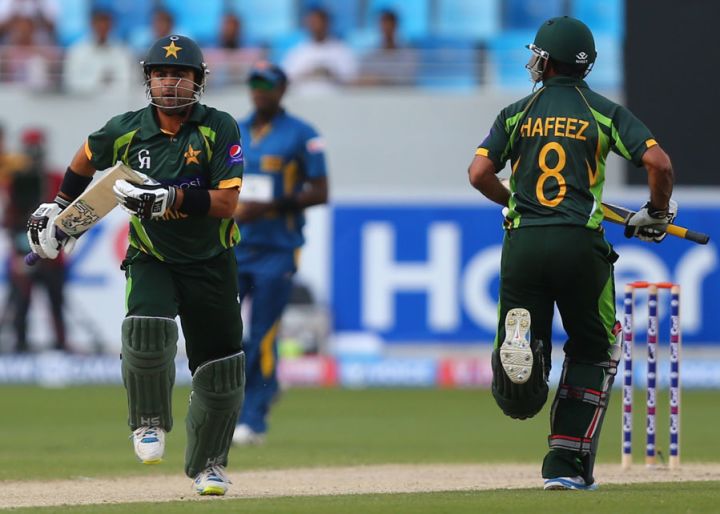Pakistan's top-order problems could cost them at the World Cup
The side is unimpressive on paper, and the bowling line-up is spotty too, but Pakistan have always done well with the odds stacked against them

It is slightly hard to make a judgement about Pakistan's World Cup squad. The rumours and whispers heard in the lead-up to the announcement led many to expect the worst, and so the final 15 largely prompted a lot of relief. But have Pakistan picked their best possible squad, or one with the best chance of winning the tournament? The answer is inconclusive at best and a flat "no" at worst.
The exclusion of Fawad Alam was perhaps the most controversial call, although it was cushioned slightly by Haris Sohail and Umar Akmal making the squad. Like Fawad , these two are busy ODI players, who play at a decent tempo and are used to rotating the strike. But the logic, or rather lack thereof, for Fawad's exclusion was more worrisome - it is one thing to drop a man averaging almost 70 for the year, but quite another to attempt to justify it with perceptions of his physique and style rather than the stunning stats he achieves.
Beyond Fawad's patently unfair exclusion, it was also a relief to see Shoaib Malik and Kamran Akmal not making their way into the side. A look at their recent numbers would have made this an obvious decision. Yet both players were pulling strings across the media to make their case, and actually seemed to be seriously considered. Their not making the side was a pro to chalk up against the con of dropping Fawad.
Meanwhile, it is a testament to Pakistan's innate belief in their bowling that this aspect of their squad didn't set off the alarm bells it would have elsewhere. Losing both Saeed Ajmal and Mohammad Hafeez was an unprecedented blow, and it means Pakistan will be trying a new strategy during the tournament after four years of having those two. Shahid Afridi has often shone as the joker in the bowling pack, but having him as the effective leader is a different, and unproductive, situation. Moreover, Junaid Khan hasn't come back from his injuries, while Mohammad Irfan is still prone to them. Wahab Riaz is expensive, Ehsan Adil is a novice, Sohail Khan is a second-try, and Yasir Shah is untested. But it is genuinely difficult to get too worried - Pakistan's attack finds a way in most places, and New Zealand and Australia will always have enough to keep them busy.
A cause for concern - and the biggest reason why Pakistan realistically don't have a chance of winning the tournament - is the top order. Though he has my unconditional love and respect, Younis Khan's inclusion in the side is unwarranted based on his numbers and performances. Add Misbah to the mix and you have two batsmen who play ODI cricket from a previous era. The fact that Younis looked terribly scratchy in recent matches and that Misbah lost his previously phenomenal ODI form in 2014 makes things worse.
Equally worrying are the openers, Hafeez and Ahmed Shehzad. Shehzad had a great year in 2014, but he is a player who takes up a lot of deliveries to get going. Hafeez never seems to deliver in important matches, and is also poor at rotating the strike and scoring at a quick tempo. Given that these four will take up the top batting slots, Pakistan's chances of putting up large totals or chasing challenging ones already looks difficult.
The problem with Pakistan, of course, is that their entire myth centres on the "cornered tigers" way of thinking, and so having the odds stacked against them is never a bad thing. Going into the tournament with a host of untested, unknown players and some ageing senior ones is the sort of recipe that Pakistan cricket forges legends from. Moreover, the competition's format ensures that the team can stumble its way into the knockouts and look to achieve three wins on the trot from there. Of course, the last time Pakistan won three ODIs in a row against sides in the top eight was in 2011, so that could be a tough ask.
Personally, I don't think Pakistan have the squad to win the cup. Modern cricket is overwhelmingly about explosive batting, and not only do Pakistan lack such batsmen, the ones they do have are likely to be played in the lower middle order. However, trying to judge Pakistan's chances on rational factors is useless: they are at their best when written off.
Winning the cup would require at least two of their bowlers to be in predatory form (which is quite possible), and at least two batsmen to score consistently big scores (which would require some divine intervention). It would also require a slight (imagined or real), and a chip on their shoulder, because this is a team that is at its best when it wants to prove the world wrong. With Misbah, Younis and Afridi all looking to secure their legacies, there is hope that they can pool together to find some magic.
Whatever the result, 2015 looks set to be like 2003, in that it would mark the end of an era of Pakistani cricket. Given how disastrous and difficult the current period has been, it would be fitting for this nomadic, forgotten team to cap it with glory.
Ahmer Naqvi is a journalist, writer and teacher. He writes on cricket for various publications, and co-hosts the online cricket show Pace is Pace Yaar. @karachikhatmal
Read in App
Elevate your reading experience on ESPNcricinfo App.